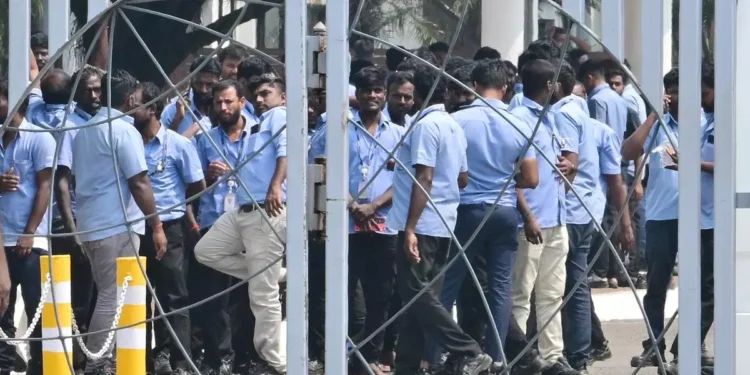Sources have revealed that Samsung officials have refused to comply with Sangam’s demand to revoke the suspension of 17 employees. This move has caused a stir in the industry, with many questioning Samsung’s decision and its impact on the employees and the company as a whole.
The issue began when the Sangam, a labor union representing Samsung employees, demanded the reinstatement of 17 suspended employees. The employees were suspended for allegedly instigating a strike that resulted in production losses. The Sangam argued that the suspension was unjust and that the employees were merely exercising their right to protest for better working conditions.
However, Samsung officials have stood firm in their decision and have refused to budge despite several rounds of negotiations with the Sangam. According to sources, the officials have cited the company’s code of conduct, which strictly prohibits any form of strike or protest that affects the company’s operations. They also emphasized the need to maintain discipline and order within the workplace.
This situation has sparked a debate on the role of labor unions and their relationship with the management. While unions have been instrumental in protecting the rights of workers, some argue that their actions can also have a negative impact on the company’s operations. This seems to be the case with the recent strike at Samsung.
On the one hand, the Sangam has a responsibility to protect the interests of its members, but on the other hand, the company has a responsibility to its shareholders and customers. This stalemate between the two parties has put a strain on their relationship and has raised concerns about the future of labor unions in the corporate world.
However, it is important to note that Samsung has always been a responsible and fair employer. The company has been recognized for its efforts in providing a safe and conducive working environment for its employees. It has also implemented various initiatives to support the well-being of its workforce, such as healthcare and education programs.
In light of this, it is understandable why Samsung officials are not willing to accept the Sangam’s demand. The company’s strict code of conduct is in place to ensure that its operations run smoothly and efficiently, which ultimately benefits its employees and stakeholders.
Moreover, revoking the suspension of the employees could set a precedent for future strikes and protests, which could have a detrimental effect on the company’s productivity and reputation. It is crucial for Samsung to maintain a strong stance to maintain a harmonious working environment and protect the rights of all its employees, not just the 17 who were suspended.
It is also worth mentioning that the 17 employees were given due process and were given a fair chance to defend themselves. The decision to suspend them was not made lightly but after careful consideration of the impact of their actions on the company. Samsung has always been transparent and fair in its dealings with its employees, and this situation is no exception.
In conclusion, while the standoff between Samsung and the Sangam may seem like a setback, it is a reminder that the company is committed to upholding its values and ensuring the smooth running of its operations. Samsung has always been a leader in the tech industry, and its responsible and ethical practices have been a key factor in its success. Let us continue to support the company as it navigates through this challenging situation and emerges stronger than ever.









